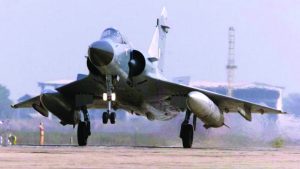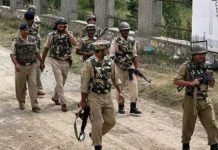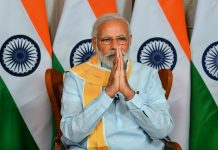 With the non-military intervention by bombing terrorists’ hideouts in the Muzaffarbad region of the Pakistan occupied Kashmir (POK), India has triggered off diplomatic initiative across the world exposing the Pakistani military’s close proximity with the terror outfits.
With the non-military intervention by bombing terrorists’ hideouts in the Muzaffarbad region of the Pakistan occupied Kashmir (POK), India has triggered off diplomatic initiative across the world exposing the Pakistani military’s close proximity with the terror outfits.
The sources close to the foreign office, the Indian diplomats have been to explain the Indian stand against terrorism in the world capitals. According to BBC news the Indian bombing has not caused much damage to the terrorists’ places in the POK, many interpret that the Pakistani authorities did not allow the media team to visit the actual places where bombing has successfully destroyed their targets .
The Indian Air Force bombing of the POK centres of the Jihadis, the Indian foreign office has asserted it as a non-military intervention. A foreign diplomat recalled that when India detonated a nuclear device in 1974, it was described a peaceful implosion, now Indian Air Force jets bomb terrorists’ hideouts in the Pakistani occupied Kashmir (POK); it is now being described a non-military intervention!
India’s foreign secretary, Vijay Gokhle told media on Tuesday, 26 February, almost within four hours of the bombings that it was a non-military intervention, which was targeted only against the terrorists and their hideouts. Meanwhile, the Indian Government through its diplomatic channels has already notified the friendly countries about the action taken against the Pakistan-based terrorists. The Pakistani side has confirmed the violation of tis air space.Major General Asif Ghafoor, Pakistan Army spokesperson has alleged that the Indian Air Force (IAF) “violated the Line of Control ” as the “aircrafts intruded into Pakistan.”
Among the high-profile diplomatic community in New Delhi, Indians are being appreciated as masters of coining words. India’s key-role in dismembering Pakistan is being seen as the victory of the democracy and sub-ntionalism of Bengalis in the East Pakistan.
It is being stated that India has succeeded persuading China to play a neutral role in the ongoing efforts of India to contain Islamic terrorism. It is considered a correct approach to keep China in good humour on this issue, because it is known all over the world that China has developed close ties with the Pakistani army, both overtly and covertly, and its civilian face, Prime Minister Imran Khan.
There are many doubting Thomases that Indian bombing was not as successful as being claimed. However, it is a fact that the bombing of the POK destinations has unnerved the Pakistani forces. For the past one week or so, the line of control (LOC) which divides, Pakistani occupied Kashmir with the Indian side of Kashmir was experiencing Pakistani violations.The Indian forces engaged the intruders at the LOC, but the 19-minute bombing with 12 Mirage supersonic jets, surprised the enemy. They already had shifted the terrorists camps quite inside in the Muzaffarbad sector, especially at Balakot, where the Jaishe-e-Mohammed terrorists had holed up with some ISIS fighters; but the Indian bombing surprised the enemy.
Dragon is silent
It is yet to be seen how much the Sino-Indian trade will influence the Chinese policy towards this ongoing confrontation. The Indian side has politely told that since Narendra Modi government has assumed power in India, the Chinese have been allowed free entry into the service sector. The Chinese goods are being dumped in India at the cost of its traditional cottage industries. The present Sino-Indian trade, which has already peaked to 72 billion US dollars, will be reduced considerably, if Chinese continue to backstab India on the issue of containing terrorism exported from Pakistan. It may be noted that the Chinese exports to India are ten times more than it imports from India.
Apart from the official trade, the Indian markets are being inundated with sub-standard Chinese goods being smuggled via Malaysia and Nepal through illegal channels. The Modi government has not taken any effective measures against these imports with a hope that Chinese may support the Indian side.
For the past two decades, Chinese authorities had bargained peace for its policies towards the Uyghur Muslims by supporting Pakistan’s Islamic Jehadis targeting India. Chinese government was apprehensive that its belligerent Muslims may get support from the Central Asian countries and Pakistan, but Pakistan quietly handed over the Uyghur Muslim activists , who were put to hard prison terms.
China has already described that Western condemnation of the repression of Muslims in China as “politically motivated” at the UN Human Rights Council. It is estimated that China has succeeded in pacifying the Muslims by arrested more than one million Muslims. They had to undergo psychological indoctrination programmes like studying Communist propaganda and giving thanks to the Chinese president Xi Jinping. Therefore, it is not surprising that China has endorsed the UN Security Council resolution on terrorism.
The Chinese province, Xinjiang, where more than 10 million Uyghurs of Turkish descent live is stated to be an autonomous region in China’s northwest that borders Kazakhstan, Kyrgyzstan, and Mongolia. Since 1949, it has been under the control of Communist China. The people of this region speak their own language, which resembles to the language used by the people of Uzbekistan. There is a demand of an independent country, because the people of this region call their land as East Turkestan.
In its effort to dilute their separate identity, Chinese have flooded the province with a large number Han Chinese and imposed the Mandrin. In 2009, riots had broken out in Urumqi, the capital of Xinjiang, which was crushed mercilessly. During the past 10 years, the region has become a key area for increasing the importance to China’s global aspirations.
With the return of Musharraf, a trusted ally of China, to Pakistan, Chinese are confident that the CPAC will be implemented without any political challenge, and it will be able to use the Pakistani port Gwador to reach the West Asian countries, much against the wishes of the western powers. The distance to Europe will be reduced considerably, and its exports will increase without en-routing through long voyages. In this backdrop, the peace initiative from Pakistan may have Chinese blessings too.
The off-the-record discussions with Xi Jinping has not added any strategic or political mileage to the present government. India has opened its economy to the Chinese, but at the cost of her own industries and banking systems.
Musharraf may return
Reham Khan, ex-wife of Pakistani Prime Minister Imran Khan, has written a book, which was published before the general elections, has revealed that former Pakistani military dictator, Pervez Musharraf, was a supporter of Imran Khan. Therefore, it is not surprising that Musharraf decides to return to Pakistan amidst mounting India-Pakistan tensions.
Many believe that Imran Khan’s olive branch for peace is a part of well-rehearsed drama having its key players in the ISI and Pakistani army. The Godfather to this move is indeed, Pervez Musharraf, the man who had toppled Nawaz Sharif Government, and had never cared to catch the assassins of Benazir Bhutto. In a recent interview to the daily, Dawn, Musharraf stated that most of the key cabinet ministers in the present Imran Khan Government had been in his cabinet, when he became president of the country in a bloodless army coup. Shah Mahmood Qureshi, who had served as Mushraff’s foreign minister, is now holding the same portfolio in the present so-called democratically elected government.
The Cabinet members who served under Musharraf in various capacities include Farogh Naseem, Tariq Bashir Cheema, Ghulam Sarwar Khan, Zubaida Jalal, Fawad Chauhdry, Sheikh Rashid Ahmad, Khalid Maqbool Siddiqui, Shafqat
Mehmood, Makhdoom Khusro Bakhtiar, Abdul Razak Dawood, Dr Ishrat Hussain and Amin Aslam. Sheikh Rashid is again appointed as the railway minister. He previously held the same portfolio under in the Musharraf cabinet.
Musharraf’s decision amidst the allegations that Prime Minister Imran Khan is a puppet in the hands of the army indicates that this allegation is not totally incorrect. Reham has recently told an Indian channel recently that Imran Khan has compromised to remain in power. She has asserted that Imran is a puppet in the hands of the Pakistan military.
According to her, he was waiting for army’s instructions before making a statement on the radio broadcast on Pulwama terror attack that martyred over 40 CRPF personnel on February 14 in south Kashmir. “He does what he is taught to do,” she has claimed.
Nuke Doctrine: Musharraf has cautioned that if Pakistan hits India with one atom bomb, India’s nuclear missiles will wipe out Pakistan. His advice is that India should be attacked with 50 nuclear bombs. However, he has told in a media interview that If Pakistan is treated as an equal sovereign country, we will reciprocate with peace. We cannot be treated like Bhutan or Bangladesh.
Maybe influenced with Musharraf’s policy towards India, Imran Khan too is blowing hot and cold. Earlier, he had asserted that Pakistan would not think before retaliating if India carried out any action against his country. The Pakistan Prime Minister also said that the state will act against those who are found involved in the attack provided India provides “actionable intelligence”.
The three incidents, Pahtnakot, Uri and Pulwama, also shows that the Indian forces in a poor light. The government has failed to explain how the terrorists could use the police vehicle to reach the cantonment in Pathankot, why Uri soldiers could not evolve a fool-proof security system, and similarly, at Pulwama why the standard operating procedure were ignored. These vital issues are being deliberately ignored on the Indian news channels, while Imran Khan is going overwhelm us with more and more peace offers. The army of Pakistan has found a popular face in Imran Khan to represent it. The judiciary is already under its spell and the only voice of dissent, Nawaz Shairf, the former prime minister, and his daughter, Mariam, are behind the bars under unproven corruption charges. The two-member bench of the Islamabad High Court bench comprising Justice Aamer Farooq and Justice Mohsin Akhtar Kiyani, which had reserved its verdict after hearing the PML-N founder’s petition to get his sentence suspended in the Al-Azizia case, has finally rejected his application on February 25. His lawyer Khawaja Harris cited the former premier’s poor health as one of the reasons why his sentence should be suspended.
The Modi Government is pitted against a country with its complexities and play of world powers in the region.












